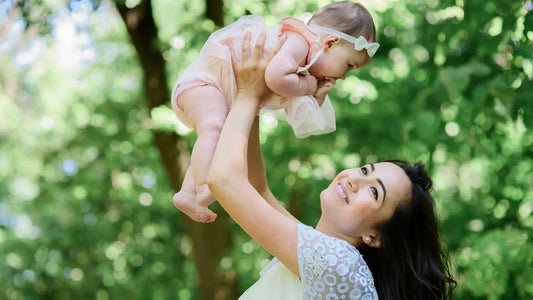Baby Breathing Patterns: What Is Normal and When to Worry
Is my baby breathing too fast or slow? Should I be concerned about their breathing pattern? It's normal to have these questions and concerns. Newborns babies often make unusual sounds and patterns while breathing. The majority of them aren't a cause for concern. But being aware of what constitutes a normal breathing pattern and what are the signs of concern in infants can help you promptly detect any concerns early.
The Basics of Baby Breathing
Newborns have distinct breathing patterns compared to adults. Their breathing tends to be irregular, with pauses lasting up to 10 seconds. This irregularity is due to the immaturity of their respiratory system. Additionally, babies are obligatory nose breathers, meaning they primarily breathe through their noses rather than their mouths. Their nasal passages are narrow, making them more susceptible to congestion.
Normal Breathing Rate
A baby's normal breathing rate can vary quite a bit, especially in the first year of life as their lungs and respiratory system continue to mature. Here are some guidelines on normal breathing rates by age:
- Newborns: 30-60 breaths per minute
- 1-6 months: 30-50 breaths per minute
- 6-12 months: 25-40 breaths per minute
Keep in mind that a sleeping baby usually has a slower breathing rate than an awake baby. It is also perfectly normal for a newborn to have periodic breathing, where they have pauses in breathing up to 10-15 seconds, followed by a series of faster, deeper breaths before resuming a normal pattern. This periodic breathing pattern is present in about 50% of healthy infants and tends to disappear around 6 weeks.

Normal Breathing Patterns
In addition to an age-appropriate breathing rate, observing your baby's breathing pattern can provide reassurance that all is well. Signs of normal, healthy breathing in a baby include:
- Steady, rhythmic breathing without strain or effort
- Breathing mainly through the nose, not the mouth
- No noticeable flare of the nostrils with each breath
- No grunting or wheezing sounds
- Normal skin colour - not appearing pale, dusky, or blue
When to Call the Doctor
While there can be normal variations in a baby's breathing pattern, there are certain signs that warrant medical attention. Contact your doctor right away if your baby shows any of the following:
- If your baby consistently breathes more than 60 times per minute
- Difficulty breathing with nose flare or grunting
- Brief pauses in breathing exceeding 15 seconds
- Visible retractions in the ribs or above the collarbones with each breath
- Consistently making a high-pitched wheezing or vibrating sound
- Bluish discoloration of the lips, tongue, or nails
Trouble breathing in babies is sometimes caused by conditions like respiratory infections, pneumonia, bronchiolitis, asthma, or allergies. Most of the time, a baby's scary breathing episode resolves on its own. Still, breathing problems should always be consulted with a paediatrician to identify and treat the underlying cause.
Conclusion
Being aware of what is normal for your baby's breathing and knowing when medical assessment is required can prevent delays in getting treatment when needed. Pay attention to both breathing rate and breathing quality, along with the baby's sleep patterns, illness symptoms, and responsiveness. While occasional irregularities are common, persistent or concerning symptoms require immediate medical attention. By staying informed and attentive, parents can ensure their baby remains healthy and safe.
Shop for the Best Baby Care Products
FAQs
1. What is a normal breathing rate for a newborn baby?
Ans. A normal breathing rate for a newborn is between 30 to 60 breaths per minute.
2. How can I tell if my baby is breathing too fast or too slow?
Ans. If your baby consistently breathes more than 60 times per minute, it might be too fast. Conversely, if their breathing rate falls below the normal range for their age group, it could be too slow.
3. Is it normal for my baby to have pauses in their breathing?
Ans. Yes, it's normal for babies to have brief pauses in their breathing, lasting up to 10-15 seconds, especially in the first weeks of life.
4. What should I do if I notice my baby making high-pitched wheezing sounds?
Ans. If your baby consistently makes high-pitched wheezing or vibrating sounds while breathing, it's important to contact your doctor promptly for evaluation, as this could indicate a respiratory issue that needs attention.
5. Why is it important to pay attention to my baby's breathing pattern?
Ans. Monitoring your baby's breathing pattern can help you identify any potential issues early on and seek medical attention if necessary. Prompt detection and treatment of breathing problems can prevent complications and ensure your baby's well-being.




